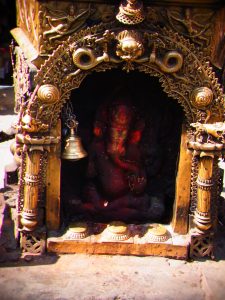Karma
What does karma mean?
We are all advancing upon our individual life paths, and in doing so we symbolically celebrate our wonderful planet Earth. The term „karma“ comes from Sanskrit, an ancient variation of the Indian language. It means something like „the effect of all doing“ and, in a nutshell, „to work, to do, to create.“
According to Buddhism, the real goal of humanity is knowledge. It is the ideal that we all live and we should strive for. The meaning of life lies not in the pleasure of gaining things, but in the desire for knowledge. Both pleasure and luck have an end and they are only temporary.

The path next to Karma
It is a great mistake to assume that the goal of human beings is pleasure. If you take a closer look to life, pleasure is the cause of all suffering and of the soul’s pain.
On the other hand, in the modern world pleasure is propagated daily and has a considerable influence on human behaviours. Many of us succumb quickly to the pleasurable distractions of modern civilization. In the course of life, however, one discovers that it is not pleasure that nourishes the soul, but the knowledge that grows steadily on the journey of life.
Both pleasure and suffering pass by the soul and leave different impressions and pictures upon it. The nature of these impressions is reflected in one’s character. The character of a human being is nothing other than an aggregate of predispositions and thus the collection of all their inclinations.
Hardship and luck are for character like the blacksmith is to metal. They can be considered as the main factors that give shape to character. Hardship is a bigger teacher than luck since it teaches more significant lessons . Namely, poverty teaches us much more than wealth can ever offer us. Similarly, blame fuels the inner fire more than any possible praise. That is why knowledge is inherently innate to man. No knowledge comes from the outside; everything is already inside our hearts.
 Knowledge rests in us like a spark in flint. The clue and opportunity are like the friction of the flint that brings forth the fire. All emotions, feelings, impulses, graces, damnations, laughter and crying are external impulses that want to be evoked in us. The result is US.
Knowledge rests in us like a spark in flint. The clue and opportunity are like the friction of the flint that brings forth the fire. All emotions, feelings, impulses, graces, damnations, laughter and crying are external impulses that want to be evoked in us. The result is US.
All these impulses considered together constitute the karma.
Every psychic or physical shock we receive, through which the spark is awakened in us and through which we discover our own inner knowledge, is karma.
Everything that happens around us is nothing but the unfolding of human thought and the manifestation of the human will.
Machinery, industry, cities, wars, hunger, distress, robots … all these things are manifestations of the human will. Everything is karma. The character is shaped by the karma.
Even more about karma
According to Sanskrit, karma embodies a spiritual ideal according to which every act and deed inevitably has its consequences, both physically and mentally. The consequences of karma do not necessarily have to show in the present life; they can bear fruit in future lives.
 Since Nepal is the land of Hinduism and Buddhism, the teachings of karma perfectly fits into our project and Karma is donates its name of the project. Connected to the belief in samsara, the cycle of reincarnation, and the principle of cause and effect on the mental level, the Karmapfad is an inspiration to both the young and the old.
Since Nepal is the land of Hinduism and Buddhism, the teachings of karma perfectly fits into our project and Karma is donates its name of the project. Connected to the belief in samsara, the cycle of reincarnation, and the principle of cause and effect on the mental level, the Karmapfad is an inspiration to both the young and the old.
Karma arises through laws. It has no judges. Nevertheless, it has eyes able to see everything without exception.
Samsara should be completely overcome, that is the ultimate goal of Buddhism. Following the Indian philosophy of the Upanishads, Karma combines the spiritual knowledge of the Atman (individual soul) with Brahman (world soul). It recognizes that they are one and an ultimately identical thing.
One who knows Confucius´s words „The way is the goal,” can easily also understand the phrase: „The path is your karma“ inspiring our project. Our karma and the Karmapfad project will hopefully bear fruit over several lifetimes.
Namasté!
